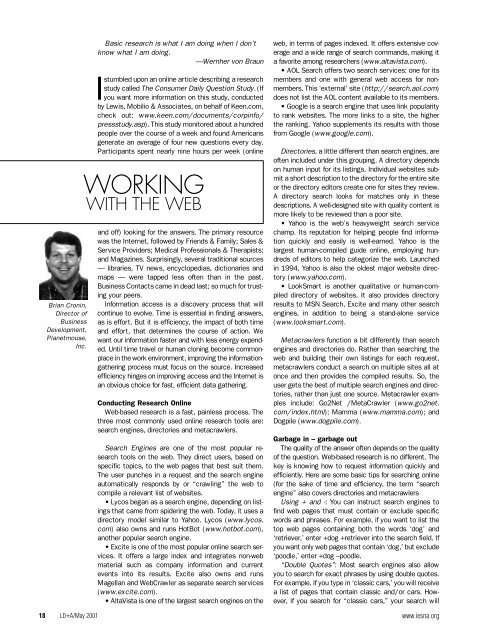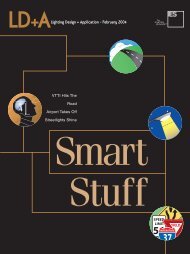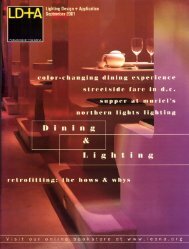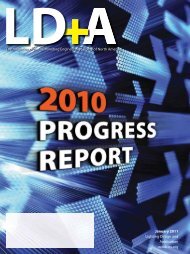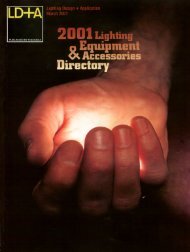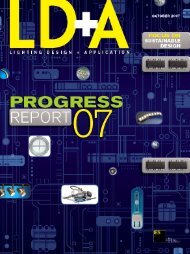Cover 1_rto4 - Illuminating Engineering Society
Cover 1_rto4 - Illuminating Engineering Society
Cover 1_rto4 - Illuminating Engineering Society
Create successful ePaper yourself
Turn your PDF publications into a flip-book with our unique Google optimized e-Paper software.
Brian Cronin,<br />
Director of<br />
Business<br />
Development,<br />
Planetmouse,<br />
Inc.<br />
Basic research is what I am doing when I don’t<br />
know what I am doing.<br />
—Wernher von Braun<br />
Istumbled upon an online article describing a research<br />
study called The Consumer Daily Question Study. (If<br />
you want more information on this study, conducted<br />
by Lewis, Mobilio & Associates, on behalf of Keen.com,<br />
check out: www.keen.com/documents/corpinfo/<br />
pressstudy.asp). This study monitored about a hundred<br />
people over the course of a week and found Americans<br />
generate an average of four new questions every day.<br />
Participants spent nearly nine hours per week (online<br />
WORKING<br />
WITH THE WEB<br />
and off) looking for the answers. The primary resource<br />
was the Internet, followed by Friends & Family; Sales &<br />
Service Providers; Medical Professionals & Therapists;<br />
and Magazines. Surprisingly, several traditional sources<br />
— libraries, TV news, encyclopedias, dictionaries and<br />
maps — were tapped less often than in the past.<br />
Business Contacts came in dead last; so much for trusting<br />
your peers.<br />
Information access is a discovery process that will<br />
continue to evolve. Time is essential in finding answers,<br />
as is effort. But it is efficiency, the impact of both time<br />
and effort, that determines the course of action. We<br />
want our information faster and with less energy expended.<br />
Until time travel or human cloning become commonplace<br />
in the work environment, improving the informationgathering<br />
process must focus on the source. Increased<br />
efficiency hinges on improving access and the Internet is<br />
an obvious choice for fast, efficient data gathering.<br />
Conducting Research Online<br />
Web-based research is a fast, painless process. The<br />
three most commonly used online research tools are:<br />
search engines, directories and metacrawlers.<br />
Search Engines are one of the most popular research<br />
tools on the web. They direct users, based on<br />
specific topics, to the web pages that best suit them.<br />
The user punches in a request and the search engine<br />
automatically responds by or “crawling” the web to<br />
compile a relevant list of websites.<br />
• Lycos began as a search engine, depending on listings<br />
that came from spidering the web. Today, it uses a<br />
directory model similar to Yahoo. Lycos (www.lycos.<br />
com) also owns and runs HotBot (www.hotbot.com),<br />
another popular search engine.<br />
• Excite is one of the most popular online search services.<br />
It offers a large index and integrates non-web<br />
material such as company information and current<br />
events into its results. Excite also owns and runs<br />
Magellan and WebCrawler as separate search services<br />
(www.excite.com).<br />
• AltaVista is one of the largest search engines on the<br />
web, in terms of pages indexed. It offers extensive coverage<br />
and a wide range of search commands, making it<br />
a favorite among researchers (www.altavista.com).<br />
• AOL Search offers two search services: one for its<br />
members and one with general web access for nonmembers.<br />
This ‘external’ site (http://search.aol.com)<br />
does not list the AOL content available to its members.<br />
• Google is a search engine that uses link popularity<br />
to rank websites. The more links to a site, the higher<br />
the ranking. Yahoo supplements its results with those<br />
from Google (www.google.com).<br />
Directories, a little different than search engines, are<br />
often included under this grouping. A directory depends<br />
on human input for its listings. Individual websites submit<br />
a short description to the directory for the entire site<br />
or the directory editors create one for sites they review.<br />
A directory search looks for matches only in these<br />
descriptions. A well-designed site with quality content is<br />
more likely to be reviewed than a poor site.<br />
• Yahoo is the web’s heavyweight search service<br />
champ. Its reputation for helping people find information<br />
quickly and easily is well-earned. Yahoo is the<br />
largest human-compiled guide online, employing hundreds<br />
of editors to help categorize the web. Launched<br />
in 1994, Yahoo is also the oldest major website directory<br />
(www.yahoo.com).<br />
• LookSmart is another qualitative or human-compiled<br />
directory of websites. It also provides directory<br />
results to MSN Search, Excite and many other search<br />
engines, in addition to being a stand-alone service<br />
(www.looksmart.com).<br />
Metacrawlers function a bit differently than search<br />
engines and directories do. Rather than searching the<br />
web and building their own listings for each request,<br />
metacrawlers conduct a search on multiple sites all at<br />
once and then provides the compiled results. So, the<br />
user gets the best of multiple search engines and directories,<br />
rather than just one source. Metacrawler examples<br />
include: Go2Net /MetaCrawler (www.go2net.<br />
com/index.html); Mamma (www.mamma.com); and<br />
Dogpile (www.dogpile.com).<br />
Garbage in – garbage out<br />
The quality of the answer often depends on the quality<br />
of the question. Web-based research is no different. The<br />
key is knowing how to request information quickly and<br />
efficiently. Here are some basic tips for searching online<br />
(for the sake of time and efficiency, the term “search<br />
engine” also covers directories and metacrawlers<br />
Using + and -: You can instruct search engines to<br />
find web pages that must contain or exclude specific<br />
words and phrases. For example, if you want to list the<br />
top web pages containing both the words ‘dog’ and<br />
‘retriever,’ enter +dog +retriever into the search field. If<br />
you want only web pages that contain ‘dog,’ but exclude<br />
‘poodle,’ enter +dog –poodle.<br />
“Double Quotes”: Most search engines also allow<br />
you to search for exact phrases by using double quotes.<br />
For example, if you type in ‘classic cars,’ you will receive<br />
a list of pages that contain classic and/or cars. However,<br />
if you search for “classic cars,” your search will<br />
18 LD+A/May 2001 www.iesna.org


